Wild West Online is leaving its own early access program on May 10, at which point it'll be available on Steam. The history-inspired sheriffs and outlaws MMO will introduce a faction system to lend some extra structure to PvP, as well as new PvP events. We got a chance to rustle some new information out of executive producer Stephan Bugaj about what to expect when we ride west.
PC GAMER: First off, as a history nerd, I'd love to know when and where WWO is meant to be set. Did you have a specific place and year in mind?
Stephan Bugaj, executive producer: Wild West Online is set in a fictional county that mixes the environments of Northern Mexico, Arizona, Colorado and California’s alpine forests.
When we started brainstorming the game’s world design, we focused in on the timeframe between the 1870s and early 1900s. When you play the game, you’ll notice that most of the weapons, fashion and overall technology is closest to the late 19th century. We don’t have early 20th century weapons, and we made a decision that all of our guns would use cartridges and not the percussion cap variety.
One interesting thing that we decided to do is have Wild West Online’s world age through the years and not be frozen in time. When we formally launch the game in May, the world’s architecture will be from the mid 1800s and have more of the frontier feel. But as we go forward, you will notice towns and settlements will start to change. Some buildings will be torn down, new ones will be erected, larger towns will get sidewalks and eventually main streets will be paved, rail tracks and train stations will cover the map and you’ll get trains running. Oil pumps will appear on the map and factions will start fighting for those.
We want to make our world feels alive, and more important to make sure that players who left the game find something new and different when they come back in a couple months. Not just by adding new content like new weapons, new quests and events, but by evolving the world itself.
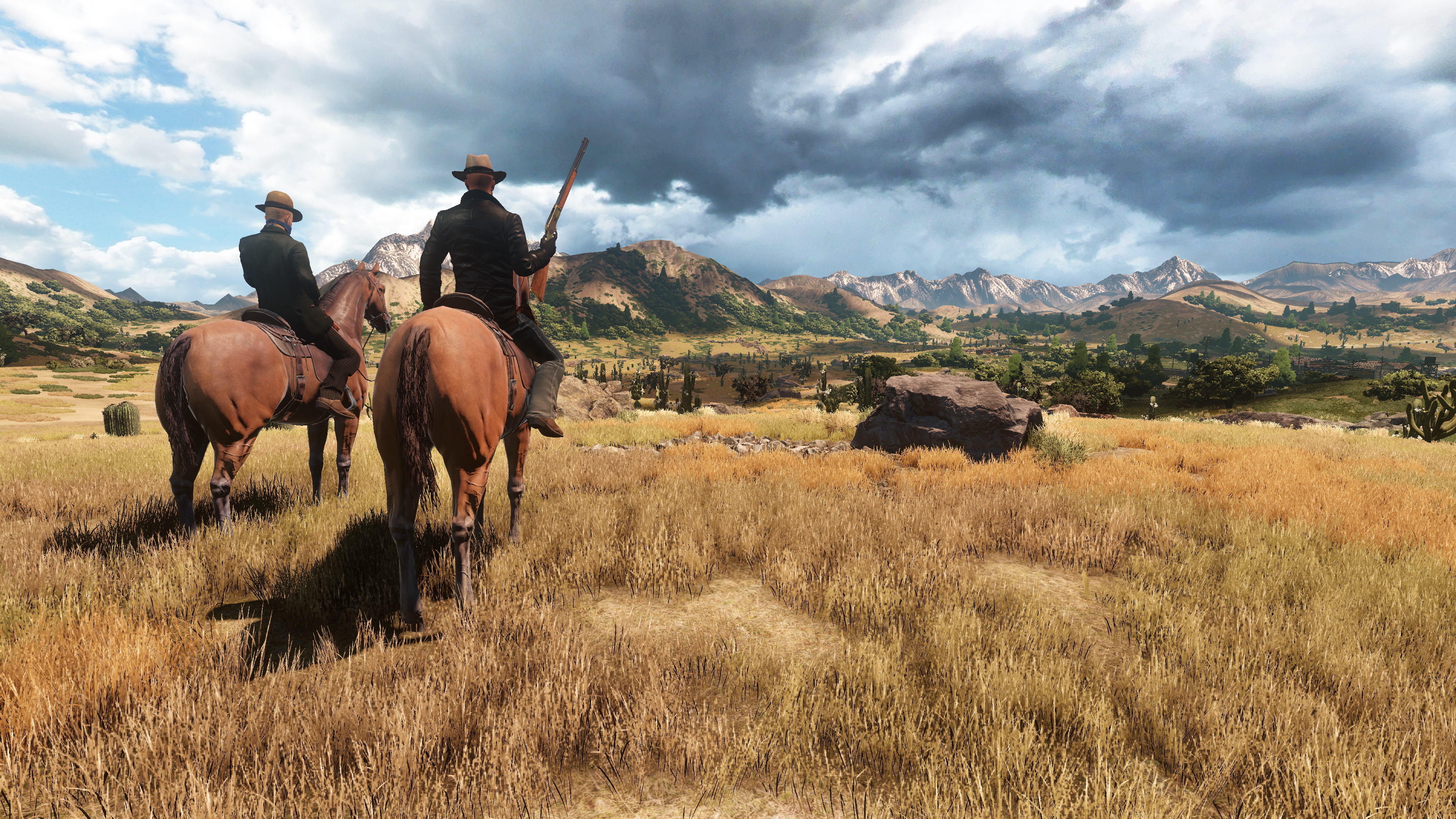
Choosing to be either a sheriff or outlaw is one of the choices players will need to make in the game.
What kind of historical research went into development, and can you give us any examples of something cool you learned in doing that research?
The biggest gaming news, reviews and hardware deals
Keep up to date with the most important stories and the best deals, as picked by the PC Gamer team.
We spent around two or three months before we got into the initial design by getting our hands on everything that we could find about the Old West during the late 1800s. We talked to historians and gun collectors, as well as visited places in California such as Bodie, Calico and Goldfield. We also visited modern “movie ranches,” including the Paramount ranch (of Westworld and Deadwood fame), Big Sky, Veluzat and Melody ranch. Our awesome sound team recorded hundreds of hours of materials—ambient sounds, old wood flooring creeks, guns from the era, everything we’ve been able to find.
And of course, we watched hundreds of movies and TV series that focus on The Wild West. All that gave us tons of materials on how people lived back then, what they wear, and why. I think by now we only have maybe 10 percent of the material that we gathered put into the game. We have much more available that we can put into Wild West Online.
One interesting thing we learned about the Wild West during our research is that it turned out that while it’s common knowledge that women in a those days didn’t have the same rights or opportunities that their male counterparts enjoyed (for example, many stores did not allow women to walk in, much less to make a purchase), in fact in some areas they had much more power. Saloon girls over time amassed riches that allowed them not only to buy nearby land, but also invest their savings into new businesses, making some of the frontier towns and camps to be practically owned in their entirety by women who entertained men in saloons and brothels. For example, by the time Fannie Porter of Texas retired, sources said she had a net worth of over hundreds of millions of dollars in today’s money. That was way more than even most successful prospectors and businessmen made [at the time].
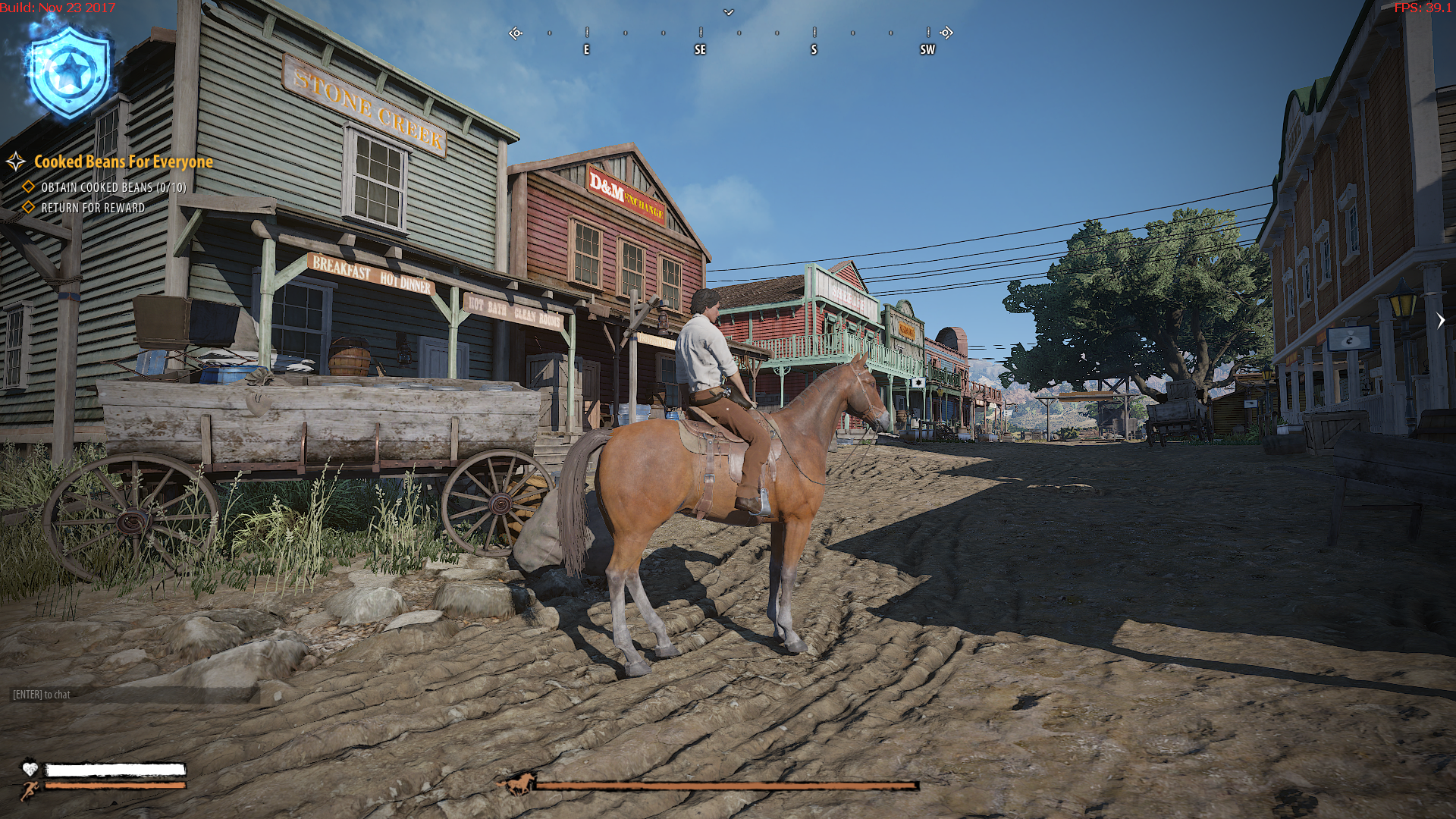
You've mentioned wanting to add "rich" roleplaying features, which is something I tend to find very lacking in most modern MMOs. Can you tell us about some of these features?
We initially thought that we’re going after two types of players—core players who are looking for an action PvP MMO game set in a wild west setting, and players who are looking for more a deep, almost [Dungeons & Dragons] style of roleplaying, where they can live in a world and play their roles. We needed to make sure that the game will suit both types because they are complete opposites of each other. We designed the game systems to allow players to play certain roles—farmers, hunters, miners, and prospectors—engage in a trade and fight. For PvP players we’ve made sure that we have enough events going on in the world that will allow them to focus on killing their enemies and reaping rewards.
Overall, we hope that players will find good variety of activities and possibilities to fulfill their playstyle.
Will there be dedicated roleplaying servers? If so, will they have different rules and mechanics from other servers to help deter trolls who want to ruin the roleplaying experience?
This is something we planned from the start and we’re expecting for those servers to become available shortly after the Steam launch. We want to give players the ability to run their own instances of the game world and basically define rules of the land. And give them the ability to enforce those rules—ban players from accessing their servers, kick mischief-makers, etc. This is something we’re actively working on, so we welcome everyone to discuss this on our forums.
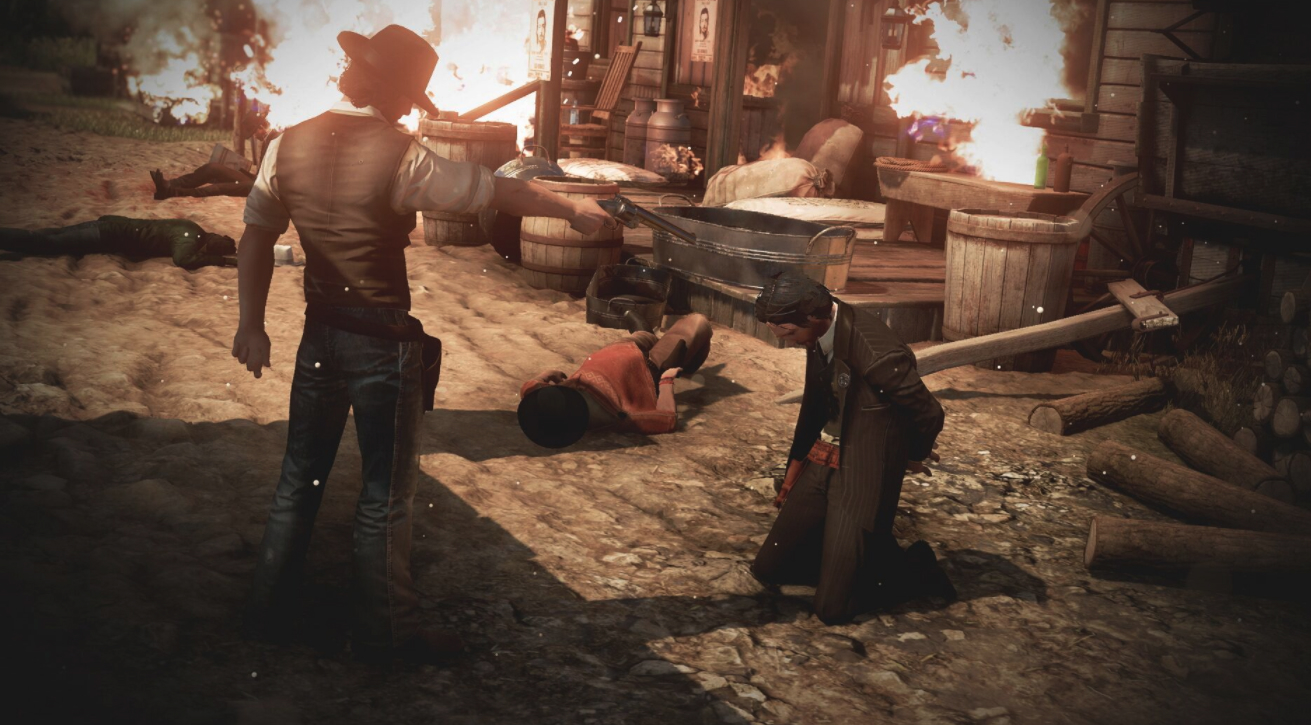
We decided to do is have Wild West Online’s world age through the years and not be frozen in time.
Does WWO have a story that players interact with?
Early in a development we made a conscious decision to focus on a systems-driven, open-world environment instead of story-driven narrative. While we don’t have a main story arc, we are planning to provide players with small stories in the form of instanced raids and limited-story NPC interactions. First and foremost our focus is on a system-driven multiplayer game, where players will create their own stories to share.
What led you to the decision to add factions to WWO?
Our initial design for WWO was solely focused on a non-restricted open world PVP with systems in place to make sure that we don’t have a rampant “kill on sight” issue. During our initial technical alpha tests back in a summer of 2017 and our early alpha tests of the fall of 2017 we saw very clearly what players demanded and that they wanted to have was some sort of the defined conflict in the game—"Red vs Blue," so to speak.
We added factions as an experiment that proved that it works in general, yet it breaks many of our existing systems—the whole sheriffs vs outlaws gameplay went down the drain, for example. However, we received an initial positive reaction to the factions, so we went and redesigned the whole system to focus on making sure that our other systems will work with factions. Players will have to pledge allegiance to one of the families and help them to dominate land. What we did there is essentially set grounds for a future Clans system, where we’ll allow all players to create their own families and bring them to world’s domination.
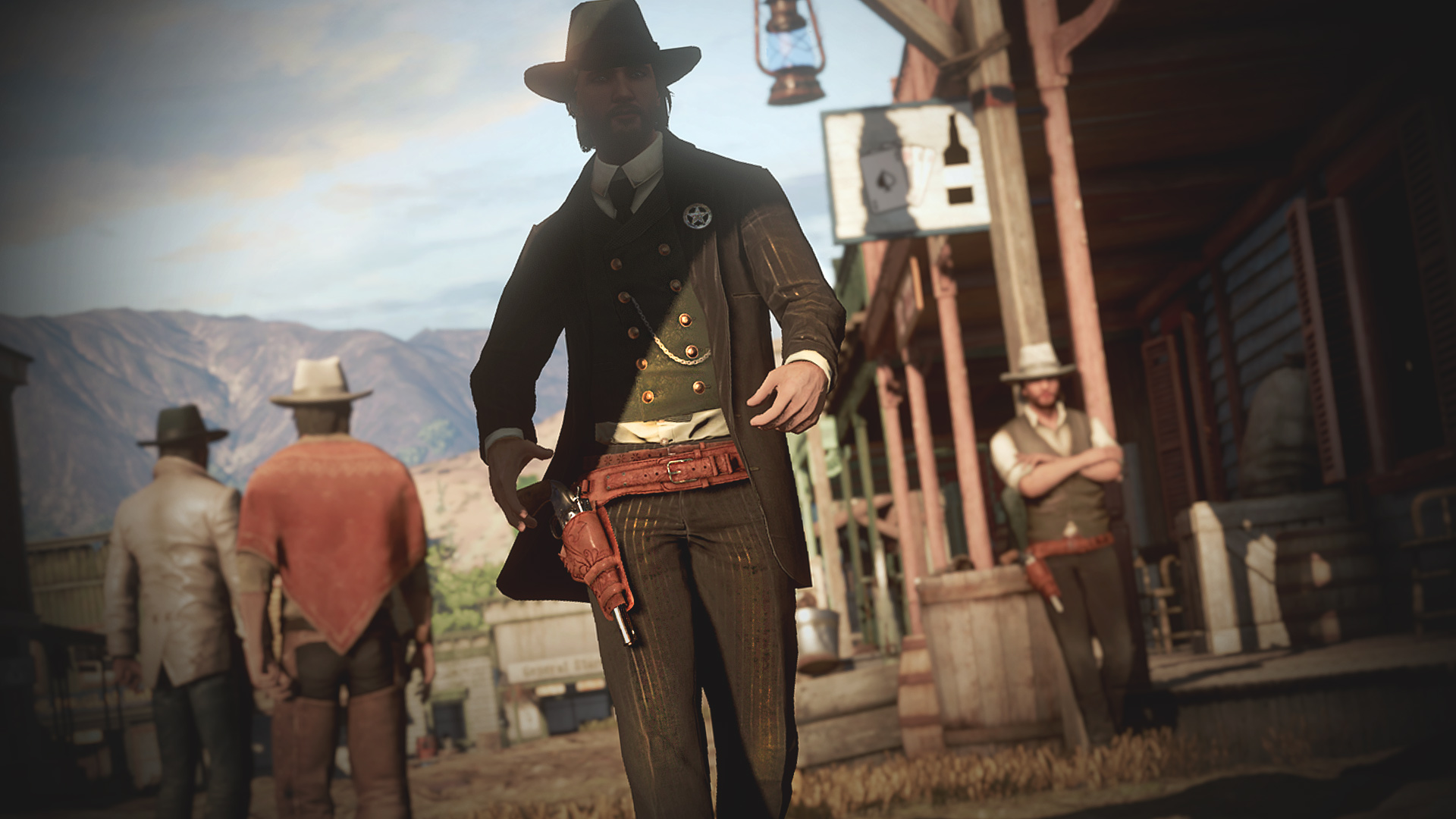
We also allow players to unlock and use more permanent structures, including hideout cabins that allow fast travel.
I think the most well-known, classic example of that idea for most people is Alliance vs Horde in World of Warcraft. How is the faction system in WWO similar to that and how is it different?
Good question. Our factions, aka “Families,” are much like the Horde and Alliance in Warcraft. They’re neither really bad or good, but they’re ready to do what it takes to ensure that they will prosper. Just like train baron families of the past, they’re power- and money-hungry corporations that came to this new world with one goal—to become bigger, richer, and have more power. [Players] will help them to dominate land by seizing resources and control over towns, train stations, mining camps, and oil rigs. For their work, players will be rewarded with money and rare items. Each of the families will provide access to “Faction Perks”—crafting recipes for passive and active abilities unique to each faction that will be automatically unlocked as your character reaches certain levels.
And this is our step one. Step two is when we will allow players to create their own Families, effectively making our initial factions to be just large clans. This way the game will evolve from a “Horde vs Alliance” type of game to more of a “clans vs clans” type of game.
Is the Wanted system going to be affected by factions? Like, if I indulge in some outlawry, could I be wanted by one faction but totally cool with another?
The wanted system will work independently from your associations with any faction. Sheriffs are in theory supposed to uphold the law regardless of who’s committed the crime. What we did is create a mini-game within our main game—all crimes that lead you to the outlaw status are serious crimes such as when you rob faction resource stashes, kill and rob miners, etc. The sheriff needs to find and prosecute those criminals and must also return stolen goods to the rightful owners, so it’s not walk in park either. Choosing to be either a sheriff or outlaw is one of the choices players will need to make in the game, and both roles carry both positive and negative sides.
On top of that we added reputation system. If you’re committing crimes such as petty theft, then your reputation will be negatively affected and one of the results for this is vendors will be buying goods from you at discount—hedging the risk of selling stolen goods. On other side, if you have a stellar reputation, then you can rely on your trading skill to raise prices [at which NPCs will buy items].
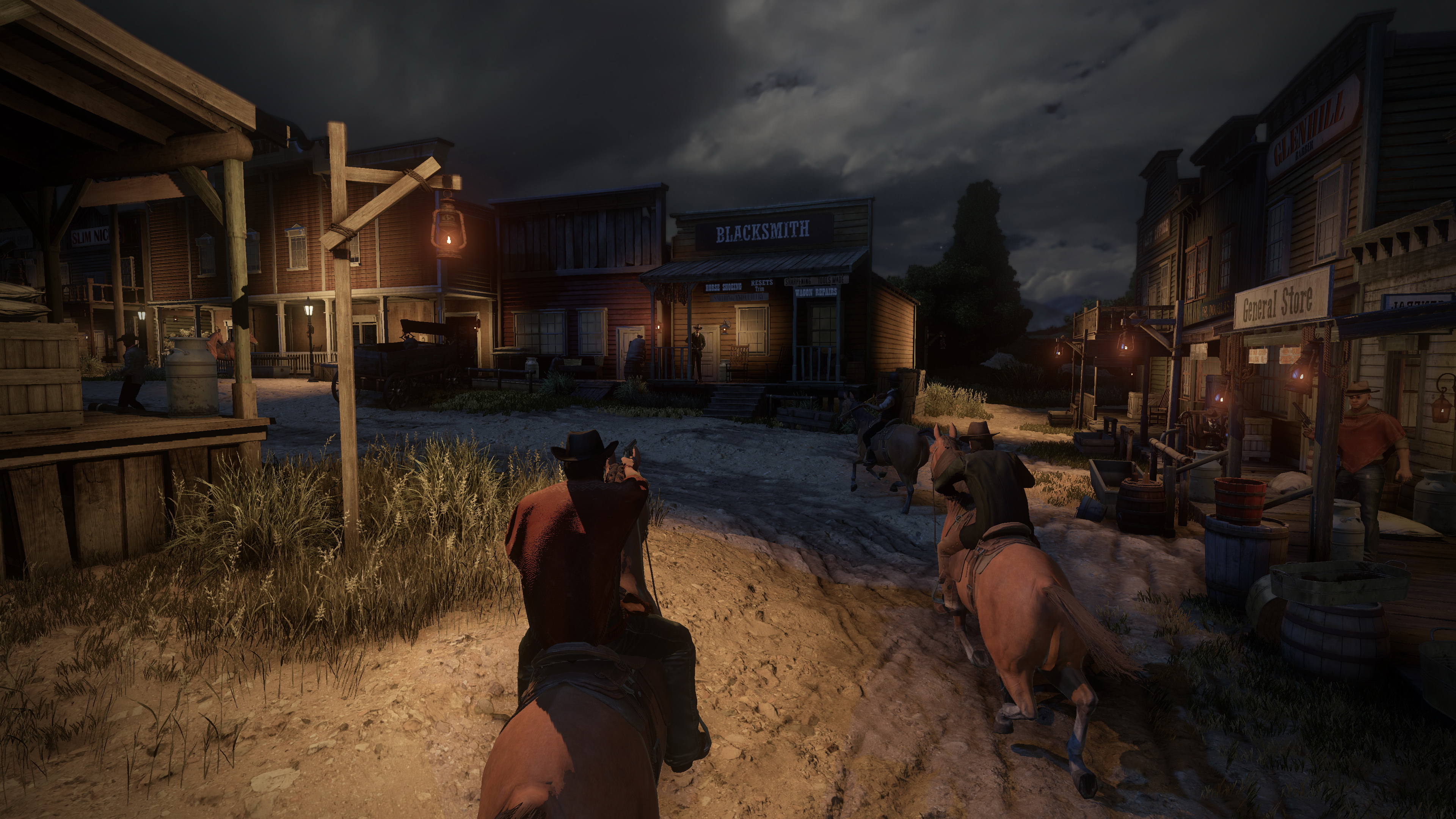
You mention players will fight for control of the world. Does that just mean if I have enough people with guns in an area, it's effectively mine? Or is there a more explicit territory control mechanic?
To get control over resources on a map—for example towns that allow your faction to control certain territories—you need to participate in the public events that occur once in a while at a random town. For capturing a town you’ll play a Battlefield-like game round, where it’s your goal to score a certain number of points for your team, and you can get those scored by variety of methods. Kill a player of the other faction and you get one point. Finding and bringing a special item that spawned in the town to your faction’s base camp [can get you] up to 50 points. Once you win, your faction gets control over the town and territory for a certain period of time.
The more territory that is controlled by your faction, the larger the passive reward for each faction member gets over time. It also opens up certain benefits such as access to special vendors, additional respawn points on death, etc.
What level of player impact are we going to see on the geography of the world? Can we set up towns, homesteads, hideouts, or anything like that out in the boonies?
One thing we’ve had in our design from day one is the idea that players will be able to set up camps in the wild, and they’ll allow you to access certain perks—crafting capabilities, changing your outfits, healing, and restoring your horse stamina. However, they were restricted by who can use them—only the player and up to four of their friends who were part of their group. With the addition of the factions to the game, we expanded the use of camps to be more of faction outposts. You’ll clearly see who owns each camp, and other players of the same faction will be able to enjoy benefits.
We also allow players to unlock and use more permanent structures, including hideout cabins that allow fast travel between points on the map, and Plantations that are instanced houses that can be owned, decorated, and [allow you to] invite friends over for parties. Think of Plantations as similar to apartments in GTA Online or housing in Final Fantasy 14, but with a slightly higher number of options available.
In the future we’re, planning to add places in the towns where you can rent as your “trade shop” and allow players to roleplay civilian professions—gunsmiths, doctors, etc.
What are some of the most unexpected pieces of feedback you got from Early Access that led you to go a different direction than you might have otherwise?
Our biggest change that was based on player feedback was our move to add more structured conflict to the game in the form of factions. We found that while some of the players were grasping the ideas of Wild West Online right away, a large group of players struggled to understand what they should do. It showed us that completely open-ended, player-driven gameplay didn’t work for the majority of players. So we redesigned the game to put in place more rigid systems to direct players to activities in the game.
Thanks to Stephen for shooting the scuttlebutt with us. Wild West Online moseys out of early access in May, but if you get in before launch you can still gain access to some exclusive cosmetic items and a 48-hour head start on the live servers.
Len Hafer is a freelancer and lifelong PC gamer with a specialty in strategy, RPGs, horror, and survival games. A chance encounter with Warcraft 2: Tides of Darkness changed her life forever. Today, her favorites include the grand strategy games from Paradox Interactive like Crusader Kings and Europa Universalis, and thought-provoking, story-rich RPGs like Persona 5 and Disco Elysium. She also loves history, hiking in the mountains of Colorado, and heavy metal music.

